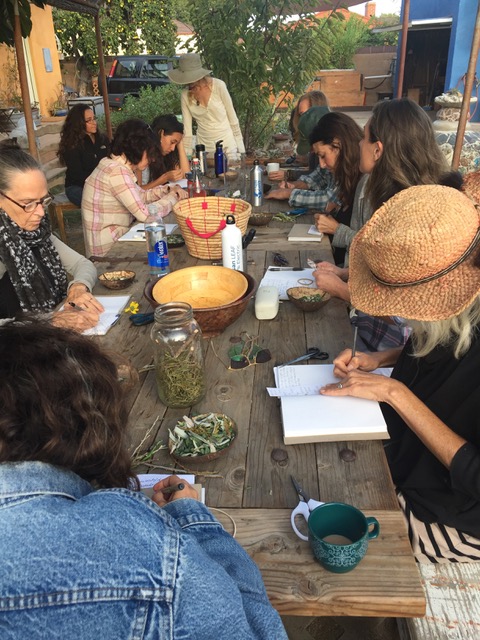1. What is foraging?
Foraging is just the act of searching for food--most people think of foraging as searching for wild food, but, technically speaking, I go foraging in my refrigerator every day.
2. Why do you forage?
First, I'd like to say that I've planted many of the edible and medicinal plants that I wild forage in my garden. Living in a city of 10 million people, our presence already has a big impact on the ability of other animals to survive and thrive. When I do wild forage plants and mushrooms, I practice ethical harvesting. That said, I forage because it deepens my connection with nature. The forest is my church, and I like to take communion with the ecological web of life on a regular basis. Plus, who doesn't love free food?
3. Can you forage in Los Angeles?
If yes, where? It depends. State Parks and some of the surrounding hills are totally off limits. Private land is always an option, so long as you have permission from the land owner of course.
4. Can I forage in my neighborhood? Is it safe?
Urban foraging is a great way to connect to the community of plant friends in your neighborhood. That said, safety depends on where you're picking, and what you're picking. Some plants do a terrific job of cleaning up our messes--taking in toxins that we use and spill, like oil that drips from our cars and poisons we spray on our lawns. Generally speaking, if a lawn is full of ""weeds"" it's probably safe to eat the dandelions growing in it. After all, if it was sprayed with a biocide, there would likely be no weeds.
5. Where can I learn more?
Come for a walk with me! You can check out my recent TEDxUCLA talk and a list of upcoming walks and workshops at: www.ericawohldmann.com - You can also learn more about the 5-month Rewilding Immersion Series that I co-teach with Nadine Flowers, a wild woman and practitioner of wilderness therapy and nature-based healing techniques.
Urban Farming 101: Q&A with Kathleen Blakistone from Moonwater Farm
Urban Farming 101: Q&A with Kathleen Blakistone from Moonwater Farm
1. Why did you start Moonwater Farm?
We originally bought the property in Compton to start an Aquaponic greenhouse growing operation. We changed directions slightly when we began to meet the urban youth of South Los Angeles who appreciated the farm experience. Today we offer school visits and workshops for all ages on sustainable food growing, healthy cooking, and partner with community members who make art, music or use the place for fundraising events.
2. What is an urban micro farm?
Our micro farm is in a neighborhood zones Residential Ag which allows residents to raise livestock, board horses and grow food commercially. We have Angora and Nigerian Dwarf goats, horses and chickens as well as row crops, a small Aquaponic system and a permaculture food forest growing on our lot.
3. What types of programs do you offer?
We offer school visits with hands on workshops in seeds, food growing, soil science and composting. We also host quarterly open houses with a farm your and pot luck lunch. Various workshops and events for adults are offered throughout the year and have included Iyengar yoga, mindful cooking, and food preservation. We also host music evenings and fundraisers by request. The property is available for events.
Summer camp is offered for 6 weeks during the summer and offers youth a host if activities throughout the week.
4. How do kids benefit from your summer camp?
Youth benefit from summer camp through hands in learning about urban agriculture - we ask an answer questions about hat is healthy food, what makes us healthy as individuals and what makes a healthy earth? We pay close attention to soil science, organic food growing and yummy food preparation
5. Are there special workshops that adults can take? How can people contact you?
We offer adult workshops and continue to grow our community with whom we can learn with. We have a mailing list people can join through our website contact form.
For more information visit Moonwater Farm's website or check out their Facebook page.













